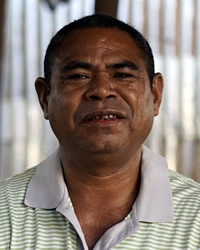The Atoni Timorese, also known as Atoin Meto or the "People of the Dry Land," are the largest indigenous ethnic group in West Timor, Indonesia, primarily inhabiting the central and western regions of Timor Island in the Belu, Malaka, North Central Timor, and South Central Timor Regencies of East Nusa Tenggara Province, as well as the Oecusse-Ambeno enclave. Their name "Atoni" simply means "people" or "man" in their language, Uab Meto, a Malayo-Polynesian tongue that underscores their Austronesian roots blended with ancient Melanesian substrates. As part of Timor's diverse ethno-linguistic mosaic, the Atoni trace origins to proto-Austronesian migrants arriving around 1000 BCE, who settled the arid savannas and river valleys, establishing hierarchical societies of patrilineal clans under liurai (rulers) that dominated central Timor through tribute systems and alliances amid inter-kingdom raids.
Pre-colonial life revolved around animistic reverence for a Lord of Heaven and Earth, with oral epics narrating prehistoric arrivals and spirit-guided migrations across the island's divided landscapes.
The 16th century brought Portuguese explorers seeking spices, establishing footholds in the east that influenced trade in sandalwood and slaves, while Dutch VOC traders in the west imposed monopolies by the 17th century, fragmenting Atoni domains into colonial spheres—Portuguese in the east and Dutch in the west—fostering hybrid economies and resistance through unified defenses.
The 19th century saw intensified missionary efforts introducing Christianity after 1910, eroding slavery and noble hierarchies while preserving adat customs; Japanese occupation during World War II devastated communities, killing tens of thousands. Post-1949 Indonesian independence integrated West Timor, but the 1975 invasion of East Timor and subsequent annexation sparked regional tensions, with Atoni communities navigating transmigration, ethnic conflicts, and the 1999 referendum violence that led to Timor-Leste's independence, displacing families across borders.
Today, they embody resilience in borderlands, upholding spatial symbolism in house designs—male interiors versus female peripheries—as a microcosm of their gendered cosmos amid modernization.
The Atoni Timorese dwell in clustered villages encircled by stone fences or shrubs amid West Timor's thorny plains and monsoon-fed valleys, where agricultural cycles and clan harmonies dictate a rhythm of communal labor and ritual introspection, blending subsistence tenacity with borderland kinships. Work hinges on the dry land's demands, with patrilineal families rotating fields for maize, rice, cassava, and peanuts on terraced slopes using water buffalo for plowing, while men herd ponies and tend coffee groves for market sales in Atambua or Kupang, and women process corn into porridge or weave tenun cloths from local fibers for barter; many supplement with seasonal fisheries or transmigrant wage labor in construction, adapting reciprocity to remittances that fund village improvements. Family dynamics center on extended patrilineal descent groups in beehive-shaped lopo houses—roofs sweeping to the ground—where elders mediate disputes via council terraces, marriages forge alliances through bride-price payments of livestock or gongs and multi-generational feasts, and child-rearing unfolds collectively with unmarried siblings and daughters remaining until dowries clear, instilling values of gendered labor and ancestral respect through epic recitations. Celebrations infuse the lunar year with fervent renewal, including harvest rites with gong orchestras and caci whip dances symbolizing fertility and defense under sacred banyans, initiation scarifications for youths evoking spirit pacts, and weddings blending church vows with ancestral toasts in circular clusters; funerals extend days in vigils with effigy processions honoring the soul's underworld journey. Food mirrors the savanna's austere yield in spiced, shared abundance, staples of jagung bubur (corn porridge simmered with coconut and chilies) paired with ikan pepes (banana-leaf-steamed fish laced with turmeric), roasted cassava leaves or wild pig adobo for vitality rites, and tempe goreng (fermented soybean fritters); tuak palm wine flows during gatherings, with klepon rice cakes capping communal platters from pandan mats, affirming bonds and the earth's measured bounty.
The Atoni Timorese predominantly embrace Christianity, (especially Roman Catholicism) a faith introduced by early 20th-century missionaries that overlays their ancestral worldview with emphases on communal salvation, ethical harmony, and divine stewardship over land and kin. This belief permeates village assemblies through vernacular prayers in Uab Meto invoking the Christian God as the Lord of Heaven, blended with rites of passage that honor creation's cycles, and pastoral guidance framing agriculture as a sacred duty. Elders interweave gospel narratives with spatial rituals, viewing house dichotomies as metaphors for divine order, while chapels anchor moral deliberations and aid, with echoes of animistic forces lingering in harvest blessings for fertility and protection.
Preservation of the Uab Meto language through bilingual curricula and oral archives is crucial to counter its erosion from Indonesian dominance in schools and media, sustaining epic traditions central to clan identity. Sustainable land management practices against drought and soil depletion would secure maize fields and coffee groves, bolstering food sovereignty tied to ritual calendars. Border health initiatives targeting malaria and maternal care would bridge access disparities in remote enclaves, enhancing resilience amid historical displacements.
Pray for strong Christ-based fellowships, discipling families, and reclaiming caci dances as testimonies of grace.
Pray for faith that exalts Christ's sovereignty and goodness.
Pray for cross-border dialogues with Tetum kin, nurturing shared worship amid Timor's divides.
Pray for resilient irrigation to sustain terraces and herds, yielding plentiful harvests for village larders.
Pray for artisan networks weaving tenun into fair trade, empowering women against urban migration.
Pray for fortified medical clinics combating fevers, upholding communities without fracturing adat ties.
Scripture Prayers for the Timorese, Atoni in Indonesia.
Britannica. "Atoni." https://www.britannica.com/topic/Atoni
Encyclopedia.com. "Atoni."
https://www.encyclopedia.com/humanities/encyclopedias-almanacs-transcripts-and-maps/atoni
Wikipedia. "Atoni."
https://en.wikipedia.org/wiki/Atoni
Wikipedia. "West Timor."
https://en.wikipedia.org/wiki/West_Timor
Cultural Atlas. "East Timorese - Core Concepts."
https://culturalatlas.sbs.com.au/east-timorese-culture/east-timorese-culture-core-concepts
Travel Food Atlas. "East Timorese Food: 7 Traditional Dishes of Timor-Leste." https://travelfoodatlas.com/east-timor-food
International Crisis Group. "Timor-Leste: Everybody needs good neighbours." https://www.crisisgroup.org/asia-pacific/timor-leste/timor-leste-everybody-needs-good-neighbours
ScienceDirect. "Tiny, Poor and War-Torn: Development Policy Challenges for East Timor." https://www.sciencedirect.com/science/article/abs/pii/S0305750X01000353
| Profile Source: Joshua Project |











